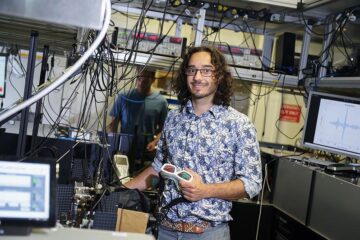EU Descartes Prize: Eight Pan-European Research Teams Compete for €1 Million Prestigious EU Science Prize

On 20 November 2003, the winners of the €1 million EU Descartes Prize for outstanding scientific and technological research through transnational collaboration will be announced in Rome. From a field of 230 research teams from all across Europe, eight were short-listed and are now competing for this prestigious EU science and technology prize. The award ceremony will take place in the Accademia Nazionale dei Lincei in Rome and will address the challenges and opportunities associated with transnational R&D careers.
Launched in 2000, the EU Descartes Prize rewards outstanding scientific and technological research carried out through transnational cooperation and partnerships. It represents a unique opportunity for EU scientists to gain visibility and wider public recognition for their contribution to scientific progress, to EU technological and economic competitiveness and to the quality of life of EU citizens.
Eight cutting-edge cross-border research projects have been selected as finalists for the 2003 prize. These cover a wide range of science and technology fields – information sciences, geophysics, life sciences, engineering, molecular chemistry and materials engineering (see Annex). The winners will be chosen by a panel of high-level personalities from the worlds of science, industry and public life. The panel will be chaired by Ene Ergma, Vice President of the Academy of Sciences of Estonia and President of the Estonian Parliament.
Participating in the award ceremony will be EU Commissioner Philippe Busquin and the Italian Vice-Minister of Education, Universities and Research, Guido Possa. Rewarding excellence and cross border collaboration, this year’s event will specifically focus on the key issue of mobility for European researchers. Indeed, enhancing transnational careers for European researchers is a crucial factor in ensuring that combined public and private research investments reach a full 3% of GDP in the EU by 2010. According to estimates, 700,000 additional researchers will be needed to achieve this target.
Media Contact
Weitere Informationen:
http://www.alphagalileo.org/index.cfm?fuseaction=readrelease&releaseid=15950Alle Nachrichten aus der Kategorie: Förderungen Preise
Neueste Beiträge

Neue universelle lichtbasierte Technik zur Kontrolle der Talpolarisation
Ein internationales Forscherteam berichtet in Nature über eine neue Methode, mit der zum ersten Mal die Talpolarisation in zentrosymmetrischen Bulk-Materialien auf eine nicht materialspezifische Weise erreicht wird. Diese „universelle Technik“…

Tumorzellen hebeln das Immunsystem früh aus
Neu entdeckter Mechanismus könnte Krebs-Immuntherapien deutlich verbessern. Tumore verhindern aktiv, dass sich Immunantworten durch sogenannte zytotoxische T-Zellen bilden, die den Krebs bekämpfen könnten. Wie das genau geschieht, beschreiben jetzt erstmals…

Immunzellen in den Startlöchern: „Allzeit bereit“ ist harte Arbeit
Wenn Krankheitserreger in den Körper eindringen, muss das Immunsystem sofort reagieren und eine Infektion verhindern oder eindämmen. Doch wie halten sich unsere Abwehrzellen bereit, wenn kein Angreifer in Sicht ist?…





















